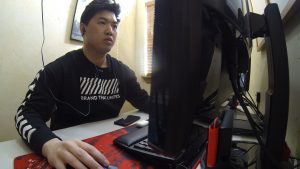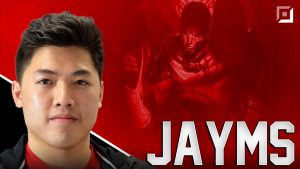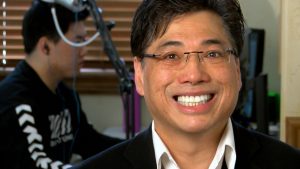College students who aren’t just playing games: Varsity esports
Apr 18, 2019, 10:56 PM | Updated: Mar 14, 2024, 7:18 pm
SALT LAKE CITY — As team captain, University of Utah junior James Tran spends a lot of time practicing, scrimmaging, and coaching younger players — 40 hours a week, he estimates.
“If you really want to become the best, if you want to have any chance to becoming pro, you have to put your whole heart and your whole soul into it,” he says.
Tran’s not talking about basketball, soccer, or any other traditional sport. He plays video games. League of Legends, to be exact. It’s called an “esport.”
James Tran –“Jayms,” he’s called online — joined the team two years ago when the university established a varsity esports program — the first Power Five school to do so.
In many ways, esports look like traditional team athletics. Tran has coaches. He reviews video of past games and opponents’ performances. The League of Legends team has even used the services of a sports psychology student. Tran also receives a scholarship — albeit a modest one — for playing the game.
“I think in order to be good at it, you just have to devote the same amount of time that you would with any traditional sport,” he says.
One Sunday morning, stationed at computers in the basement of the Entertainment Arts and Engineering building, Micah Tang, aka “Ryder,” and his teammates take on Stanford. They play Hearthstone, a computer card game. With a 12-1 record, they are the favorites.
“I always had really competitive nature but sports were always something I couldn’t I couldn’t get super good at,” Tang says.
Tang, who grew up in the LA area, was the first player the University of Utah recruited from out of state. Utah esports representatives came to his high school and held a signing ceremony in front of the student body.
“So it was, like, it was pretty cool to see esports treated on the same level is like traditional sports like baseball or football,” he says.
This morning the EAE building is empty. The only spectator in sight is a nervous coach. Nervous, because the game is too close for comfort.
What is out of sight — the four to five thousand spectators watching the game online. That may seem like a lot, especially for a mid-tournament collegiate card game, but compared to the potential esports audience, it’s nothing.
Twitch, the primary online platform for esports, has more viewers than Netflix and HBO, says esports director A.J. Dimick.
“There are two billion gamers on earth. There are 126 million esports enthusiasts and that can produce huge audiences,” Dimick says. “The 2014 League of Legends final produced a bigger audience than the NBA Finals did,” he says.
That’s is why Dimick argues the program should be under – not the School of Engineering, as it is now, but the Athletics Department and the NCAA (A spokesperson for the University Of Utah Athletics Department and the department director declined comment.). He says esports should be treated like the sport he says it is.
“It’s a sport. They’re a team. The communication is key for them. There’s a team dynamic. They scout their opponents. All the nuances that you have in a mainstream sport are present here,” he says.
“It’s not a question of is this mentally or physically taxing enough to be a sport,” says League of Legends coach James Swisher. “The question should be does this activity develop the things that we value in our student athletes.”
James Tran’s father knew little about video games when he bought his children a computer so they could work on their typing skills. Tan Tran only knew that James would sneak downstairs at 3 am to play them.
“My dad would catch me and just yell at me,” James says.
Tan Tran had been part of the migration of Vietnamese “boat people,” who fled the country following the Vietnam War. He settled in Utah, studied medicine at the University of Utah and became a physician. James Tran’s mother had been a refugee. They wanted their children to focus on education, not video games.
“We worried that he was not spend enough time studying,” Tan Tran says.
“My dad and my mom were both extremely…conservative,” James Tran says. ”They just wanted me to succeed, do a traditional job.”
While their son was doing well at school — he says he has a 3.95 GPA — he was also doing well at League of Legends, ranking in the top one percent of players nationwide. He thought about going pro, but didn’t want to disappoint his parents.
“We are very proud of him and very happy for him. Let him play and let him enjoy his life” – Tan Tran
“He (Tan Tran) was a really strict, like stereotypical Asian father. And all of a sudden, he just had a change of heart,” James Tran says.
The turning point — a League of Legends match two years ago between the University of Utah and rival BYU. Ten thousand watched online and hundreds — including Tan Tran — showed up to the live event.
“Very joyful…and everybody’s screaming, jump up and down. Cheers for James playing with his teammates,” Tan Tran recalls. “So we really thought differently after the BYU game.”
So now, with his father’s blessing, James Tran is following two career tracks.
James studies premed, so he can be a doctor like his father while “Jayms” fights to turn pro, to get a ranking high enough to attract interest from professional League of Legends teams.
Meanwhile, Tan Tran actually encourages his son to play video games.
“I’d be upstairs like in my room doing homework and I’m just sitting there like writing like doing an essay finishing my organic chemistry homework he just comes to me, is like, why aren’t you playing?,” James Tran says. “I’m just like, I’m trying to do well in school, Dad.”
“If he decided to play game professionally, I think he’s going to do well so I’m not too worried about it,” Tan Tran says.
“We are very proud of him and very happy for him. Let him play and let him enjoy his life.”














